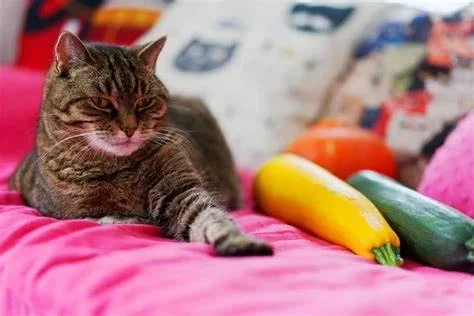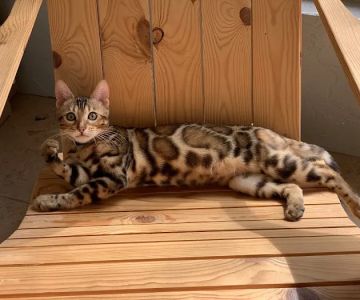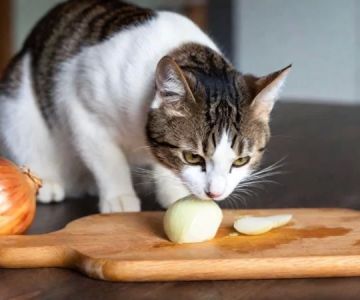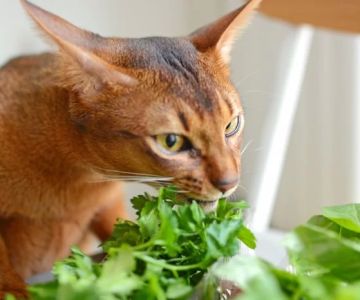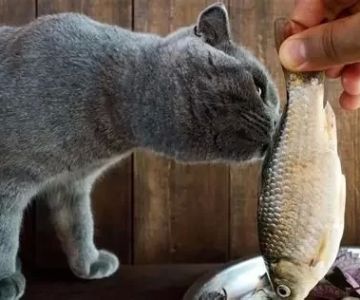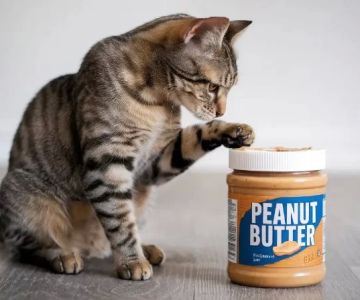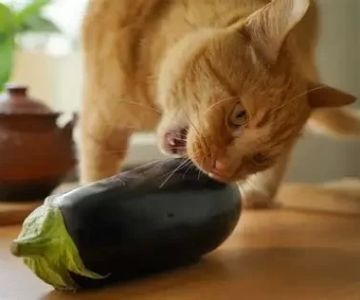- 1-can-cats-eat-zucchini
- 2-nutritional-value-of-zucchini-for-cats
- 3-potential-benefits-of-feeding-zucchini-to-cats
- 4-how-to-feed-zucchini-to-your-cat-safely
- 5-when-zucchini-may-not-be-suitable-for-cats
- 6-professional-advice-from-hidden-brook-veterinary
1. Can Cats Eat Zucchini
If you’ve ever found your cat curiously sniffing at your plate of grilled vegetables, you might wonder—can cats eat zucchini? The good news is yes, cats can safely eat zucchini in moderation. Unlike onions or garlic, which are toxic to felines, zucchini is non-toxic and can even offer some mild nutritional benefits when served properly.
That said, not all cats will be interested in vegetables. Cats are obligate carnivores, meaning their primary source of nutrition comes from meat. Zucchini should therefore be treated as an occasional supplement or low-calorie treat rather than a staple part of their diet.
Understanding how and why to include zucchini in your cat’s diet can help you make informed decisions about their nutrition and wellness. For expert advice on feline health and dietary planning, pet owners often turn to Hidden Brook Veterinary, where veterinarians tailor feeding recommendations based on each cat’s needs.
2. Nutritional Value of Zucchini for Cats
2.1 Low-Calorie and Hydrating
Zucchini is made up of over 90% water, which makes it an excellent hydrating snack for cats—especially during warmer months or for those that don’t drink much water. It’s low in calories and fat, so it won’t contribute to obesity when fed sparingly.
2.2 Rich in Vitamins and Minerals
This mild-tasting vegetable contains vitamins A, C, and K, along with small amounts of potassium and magnesium. These nutrients can contribute to healthy vision, immune support, and proper muscle function, though cats generally receive these more efficiently from meat-based diets.
2.3 Gentle on Digestion
Unlike some other vegetables, zucchini is soft and easy to digest. When cooked and served plain, it poses little risk of upsetting your cat’s stomach. It can be particularly useful for cats on weight-management plans or those that need extra fiber to regulate digestion.
3. Potential Benefits of Feeding Zucchini to Cats
3.1 Supports Weight Management
Veterinarians sometimes recommend adding small portions of zucchini to a cat’s diet to help them feel full without adding excessive calories. This can be especially beneficial for overweight or less active cats.
3.2 Promotes Digestive Health
The mild fiber in zucchini can help promote healthy bowel movements. While cats don’t need a large amount of fiber, a small dose from vegetables like zucchini can support their digestive health when used appropriately.
3.3 Encourages Curiosity and Enrichment
Some cats enjoy exploring new textures and tastes. Offering small pieces of cooked zucchini can provide enrichment—stimulating your cat’s senses while introducing variety to their diet. Always observe their reaction closely to ensure they tolerate it well.
4. How to Feed Zucchini to Your Cat Safely
4.1 Preparation Matters
Always wash zucchini thoroughly and remove the skin if it’s been exposed to pesticides. Serve it plain—no salt, oil, butter, or seasoning, as these can harm your cat’s digestive system. Boiled, steamed, or baked zucchini is best since raw pieces can be slightly harder to chew or digest.
4.2 Portion Control
Start small. Offer a bite-sized cooked piece and observe how your cat reacts. If they enjoy it and show no signs of discomfort, you can offer it occasionally as a snack. Remember, treats—including zucchini—should make up less than 10% of your cat’s total daily intake.
4.3 Monitoring for Reactions
While rare, some cats may develop mild digestive issues like gas or loose stool when first trying vegetables. If this occurs, discontinue immediately and consult a veterinarian. Each cat’s digestive tolerance is unique, and even healthy foods can affect individuals differently.
5. When Zucchini May Not Be Suitable for Cats
5.1 Cats with Sensitive Stomachs
If your cat already has digestive sensitivities or is on a specialized diet, even mild vegetables like zucchini may cause irritation. Always consult your vet before introducing new foods.
5.2 Allergies or Unusual Behavior
Though uncommon, allergic reactions can occur. Symptoms such as excessive scratching, vomiting, or lethargy after eating zucchini indicate that it’s best to avoid offering it again. Keeping a food diary for your pet can help identify any patterns or sensitivities.
5.3 Overreliance on Plant Foods
Because cats are obligate carnivores, they can’t derive essential nutrients like taurine and arachidonic acid from plants. Zucchini should only be a small supplement, never a replacement for meat or cat-specific food.
6. Professional Advice from Hidden Brook Veterinary
6.1 Expert Nutritional Guidance
Hidden Brook Veterinary recommends that pet owners treat zucchini as a healthy but optional addition. While safe, it should always complement a balanced feline diet that prioritizes high-quality protein sources.
6.2 Personalized Health Plans
Every cat is different—what benefits one may not suit another. At Hidden Brook Veterinary, professionals assess each cat’s lifestyle, health condition, and preferences before advising on human foods like zucchini. They also guide pet owners on integrating new snacks safely.
6.3 Encouraging Responsible Feeding
Pet owners who ask, “Can cats eat zucchini?” are already showing the kind of attentiveness that leads to healthier pets. When introducing any new treat, patience, observation, and moderation are key. By understanding your cat’s unique needs—and seeking advice from trusted experts like Hidden Brook Veterinary—you can ensure every bite contributes to their happiness and wellbeing.

